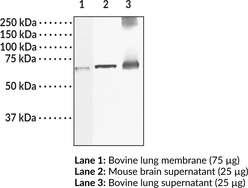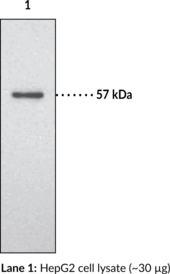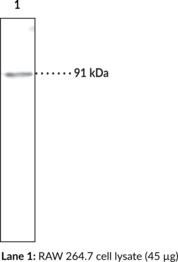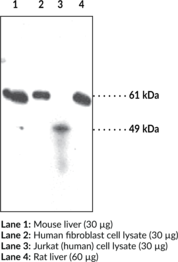Description
Soluble guanylate cyclase (sGC) is a heterodimeric hemoprotein and nitric oxide (NO) sensor composed of two subunits, α1 and β1.{59045,59046} The approximately 70 kDa sGC β1 subunit is encoded by GUCY1B3 in humans, ubiquitously expressed, and localized to the cytosol.{24381} The sGC histidine residue at position 105 is ligated to a ferrous heme that selectively binds NO to activate the C-terminal guanylate cyclase activity of the sGC heterodimer, catalyzing the synthesis of cGMP.{59045,59047} Knockdown of Gucy1B3 or expression of a heme-deficient sGC β1 subunit inhibits NO-induced reductions in blood pressure and platelet activation in mice, indicating a heme-dependent role for the sGC β1 subunit in blood pressure regulation.{59048} Cayman’s Guanylate Cyclase β1 subunit (soluble) Polyclonal Antibody can be used for immunohistochemistry (IHC) and Western blot (WB) applications. The antibody recognizes the sGC β1 subunit from human, bovine, and rat samples.
Synonyms: GCS-beta-1|Gucy1b1|sGC β1 subunit
Immunogen: Synthetic peptide from an internal region of rat sGC β1 subunit
Formulation: 500 µl of peptide affinity-purified polyclonal antibody
Isotype:
Applications: IHC and WB
Origin: Animal/Rabbit
Stability: 365 days
Application|Immunohistochemistry||Application|Western Blot||Product Type|Antibodies|Polyclonal Antibodies||Research Area|Cardiovascular System|Blood|Coagulation & Hemostasis||Research Area|Cardiovascular System|Vasculature|Vasodilation||Research Area|Cell Biology|Cell Signaling|cGMP Signaling||Research Area|Cell Biology|Cell Signaling|Nitric Oxide Signaling||Research Area|Endocrinology & Metabolism|Nutrient Sensing




